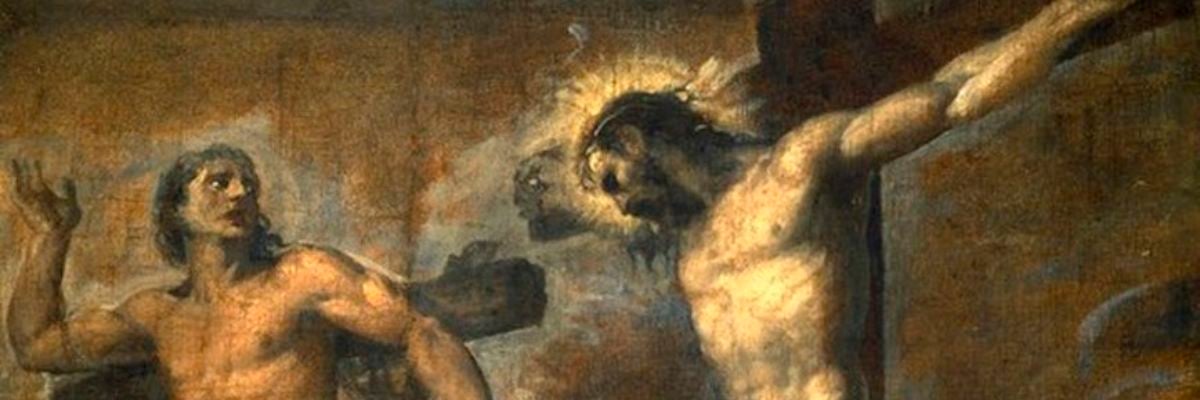
The Catholic Church has always looked to the good thief as an example par excellence of conversion (see Luke 23:39-43). This is why he is called good.
But for some Protestants the good thief, traditionally named St. Dismas, is good in more ways than one. It would seem that his story justifies doctrines held by many Protestants. For example, Dismas was saved without baptism, which at first glance could give reason to believe that baptism is not necessary for salvation.
Another doctrine held by many Protestants that the narrative seems to justify is that works are not necessary for salvation. I remember several years ago, while I was sitting in the optometrist’s chair with the big tech-y glasses on, my doctor attempted to persuade me that the good thief didn’t do any good works to receive his reward of salvation; he simply had faith. My doctor was trying to use Dismas’s story to justify his own belief that we’re justified by faith alone.
Finally, on the surface, the story of Dismas appears to justify the Protestant rejection of purgatory. How could purgatory exist, so the argument goes, when Jesus told Dismas he would be with him in heaven on that day?
Does the story of the good thief justify these Protestant beliefs? I don’t think so. Let’s deal with each in turn.
Saved without baptism?
There are two reasons why Jesus’ promise to Dismas doesn’t prove that baptism isn’t necessary for salvation.
First, if Jesus intended for us to take the Dismas story as proof that baptism wasn’t necessary, it would be unreasonable for Jesus to command baptism in Matthew 28 and make it the condition for becoming a disciple. Moreover, Peter would have been acting contrary to Jesus’ wishes when he told the Jews present in Jerusalem for the feast of Pentecost to “be baptized . . . for the forgiveness of your sins” (Acts 2:38).
The second reason is that although Jesus binds salvation to the sacrament of baptism, he himself is not bound to it (see the Catechism of the Catholic Church 1257). The Church teaches that Jesus is able to communicate the grace of salvation in extraordinary ways when circumstances preclude receiving that grace through the ordinary means of baptism:
Since Christ died for all, and since all men are in fact called to one and the same destiny, which is divine, we must hold that the Holy Spirit offers to all the possibility of being made partakers, in a way known to God, of the Paschal mystery. Every man who is ignorant of the Gospel of Christ and of his Church, but seeks the truth and does the will of God in accordance with his understanding of it, can be saved. It may be supposed that such persons would have desired Baptism explicitly if they had known its necessity (CCC 1260).
God is able to judge the human heart (see 1 Samuel 16:7). He knows whether a person is truly seeking the truth. And whatever truth a person is ignorant of, God knows if that person is responsible or not and will judge accordingly. In as much as a person implicitly desires God, he implicitly desires all things that God wills, including the sacraments.
This does not mean baptism is not necessary for those to whom it has been revealed. According to Jesus, baptism is our new birth (see John 3:3-5) and he makes it the gateway for membership in his church (see Matthew 28:19), which is his body (see 1 Corinthians 12:13).
Saved without works?
What about Dismas being saved without works? Does this justify the belief that works have nothing to do with our salvation? By no means.
First, the objection betrays a far too narrow view of what good works means. Sure, Dismas didn’t feed the poor or perform some other humanitarian work, but he did come to the defense of Jesus and proclaim Jesus’ innocence. Isn’t that a good work?
Moreover, Dismas repented. It would seem to me that both of these involve an act of the will animated by charity. Hence, James’ teaching would apply: “You see that a man is justified by works and not by faith alone” (James 2:24).
Second, even if one is inclined not to accept the defense of Christ’s innocence and repentance as good works, the fact that Dismas was physically incapacitated to do good works doesn’t affect the principle that good works are necessary for salvation. For example, I might have the flu and be physically incapacitated to go to Mass on Sunday, but that doesn’t mean the Sunday obligation doesn’t exist.
To use a more Protestant-friendly example, Paul says confession of Jesus’ lordship is necessary for salvation: “[I]f you confess with your lips that Jesus is Lord . . . you will be saved” (Rom. 10:9). But what about those who are mute? Does their inability to confess with their lips mean that they can’t be saved? Of course not. Similarly, Dismas’s inability to perform good works doesn’t mean good works aren’t necessary.
Dismas showed his will was rightfully ordered toward the good. Had he the opportunity, I’m sure he would have done good works.
So, I guess my optometrist will have to find another argument to justify his position.
No pit stop necessary
But what about the belief that this story proves purgatory is false? If heaven is given to Dismas on that day, then there is no need for any sort of final purification, right?
If one means no final purification for Dismas in particular, then yes. But if one means no final purification absolutely, then no.
Even if we concede that Jesus was talking about heaven when he referenced “paradise,” and Dismas was going to receive heaven on that day without a final purgation, it wouldn’t disprove the existence of purgatory. The Church teaches that it’s possible to die in a state of holiness sufficient enough to bypass the final purification:
Each man receives his eternal retribution in his immortal soul at the very moment of his death, in a particular judgment that refers his life to Christ: either entrance into the blessedness of heaven—through a purification or immediately (CCC 1022).
A conversion which proceeds from a fervent charity can attain the complete purification of the sinner in such a way that no punishment [temporal punishment] would remain (CCC 1472).
Dismas may very well have gone through a conversion fervent enough to completely satisfy the temporal punishment due for his sin and thus have no need for purgatory. That’s a fair claim for Catholics to make.
But what if Dismas’s conversion wasn’t fervent enough? What if he still needed further purgation, which is what you might think, since Dismas was a criminal dying on a cross? Wouldn’t it seem reasonable that the don (the leader of a mafia gang) who repents on his deathbed would surely need to make up for his crimes? If Dismas needed further purgation, and he was given heaven on that day, then wouldn’t that disprove purgatory?
Again the answer is no. The Church has never defined the exact nature of the duration for the final purification. The common understanding in the tradition of the Church is that it is prolonged, but it’s not necessarily a prolonged duration. For some souls it could be something akin to an instantaneous purgation (a very quick movement from potency to act).
So even if Jesus is referring to heaven, and Dismas receives it on that day, it doesn’t follow that he wouldn’t have to go through a final purification. He could have experienced a quick refinement and still entered heaven on that same day.
Another response is that the argument assumes that the word paradise means heaven, which is not necessarily the case. The Greek word for “paradise,” paradeiso, means “the abode of the blessed dead” (A Manual Greek Lexicon of the New Testament, 339), which at the time of Jesus’ crucifixion wasn’t heaven, since Jesus had not yet ascended. Such a place was the “prison” to which Jesus went after his death in order to preach to the spirits held there (see 1 Peter 3:19). He would not release those spirits until his ascension:
When he ascended on high he led a host of captives, and he gave gifts to men. In saying, “He ascended,” what does it mean but that he had also descended into the lower parts of the earth? He who descended is he who also ascended far above all the heavens, that he might fill all things (Eph. 4:8-10).
So it may well be the abode of the dead that Jesus promised to be with Dismas on that day, not heaven. As such, Dismas could very well have experienced his final purification there—that is, if he still needed purgation.
Conclusion
Although Protestants can agree with Catholics that Dismas was a good thief for his conversion, they can’t claim him as good for the Protestant doctrines listed above. In fact, the details surrounding Dismas’s conversion actually harmonize best with the Catholic understanding of salvation and the afterlife. Catholics, therefore, need not fear. We can still claim Dismas as our saint.



